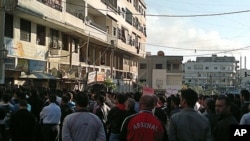The Syrian government has reportedly brought in reinforcements to the flashpoint southern city of Daraa, amid international condemnation of the military crackdown on widespread popular protests.
Dozens of flatbed trucks were seen transporting tanks on the main Damascus highway leading to the flashpoint city of Daraa Wednesday. Witnesses told Arab satellite TV channels that they also saw army reinforcements heading to the city.
Witnesses say living conditions inside Daraa have deteriorated, as food, milk, bread and water are running short. Electricity and telephone service remain cut.
Sporadic gunfire is reported. Syrian rights groups say that more than 30 people have been killed since the military crackdown in Daraa began Monday.
Syrian government television continued to insist that "armed gangs" are provoking violence and attacking security forces. The station showed members of two alleged armed gangs who it said were captured along with dozens of weapons.
|
Former U.S. Ambassador to Damascus Ted Kattouf talks about the situation in Syria with Mohamed Elshinnawi:
|
A number of Western nations have condemned Syria’s use of force against protesters. United Nations Secretary-General Ban Ki Moon demanded that the violence stop. "I condemn utterly the continuing violence against the peaceful demonstrators, most particularly the use of tanks and live fire that have killed and injured hundreds of people," he said.
The United Nations Security Council discussed a statement to condemn the violence Tuesday, but it reportedly met with resistance from Russia and China. Further discussion is expected Wednesday.
Syria’s ambassador to the U.N., Bashar al Jaafari, insisted that a proposed U.N. investigation into recent violence is unnecessary because Damascus is conducting its own internal investigation:
He says President Assad has ordered that a [Syrian] committee be formed to uncover the reasons behind the deaths of demonstrators, as well as those of soldiers and police.
Hilal Khashan, a professor of political studies at the American University of Beirut, says that Syrian President Bashar al-Assad and his inner circle were motivated to quell protests before they gathered momentum:
"Assad has an inner core," he said. "This inner core runs the political system. It includes, of course, in addition to himself, his brother Maher who commands the elite Republican Guard, and his brother-in-law Assef Shawqat, and a few other Alawites. Now, these people have resolved to deal with the protests harshly. There might be dissension. There are defections. But, the regime is in full control of the military."
Khashan says he does not think the survival of the Assad regime is now at stake, because Syria’s two largest cities, Aleppo and Damascus, remain largely quiet. He stresses, however, that an insurrection would be "impossible for the government to crush" if it spread to those key cities.




